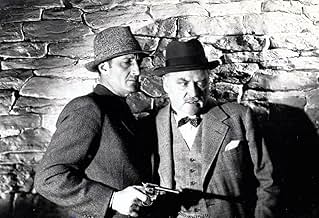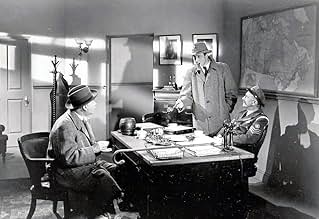After a gentlewoman is found dead with her throat torn out, the villagers blame a supernatural monster. But Sherlock Holmes, who gets drawn into the case from nearby Quebec, suspects a human... Read allAfter a gentlewoman is found dead with her throat torn out, the villagers blame a supernatural monster. But Sherlock Holmes, who gets drawn into the case from nearby Quebec, suspects a human murderer.After a gentlewoman is found dead with her throat torn out, the villagers blame a supernatural monster. But Sherlock Holmes, who gets drawn into the case from nearby Quebec, suspects a human murderer.
- Bill Taylor
- (uncredited)
- Lady Lillian Gentry Penrose
- (uncredited)
- Villager in Pub with Dr. Watson
- (uncredited)
- Villager in Pub
- (uncredited)
- Villager in Pub
- (uncredited)
- Hotel Bellhop
- (uncredited)
Featured reviews
The story hearkens back to such titles as THE HOUND OF THE BASKERVILLES. Lord Penrose (Paul Cavanaugh) is convinced that his small, Canadian town is beset by an evil spirit--and is indeed giving a lecture on psychic phenomena when his wife is found murdered, presumably by a apparition that haunted the town many years before. Convinced that it is the work of an otherwordly being, he does not welcome the arrival of Sherlock Holmes (Basil Rathbone), who is convinced that there is nothing ghostly about the matter in the least.
The Universal films counted a great deal on the chemistry between Basil Rathbone and Nigel Bruce as Holmes and sidekick Dr. Watson, and indeed that chemistry is on full display in this particular title. But the overall cast is remarkably fine, not only the aforementioned Cavanaugh but most particularly Gerald Hammer, who frequently appeared in these films and here offers a uniquely memorable turn as the fearful postmaster. And, unlike most other films in the series, the solution to the crime is indeed a shocker.
The restoration is very handsome and the DVD comes with two nice bonuses, a short documentary on the challenges faced by those who restored the series (THE SCARLET CLAW receives particular mention) and an erudite audio commentary by film historian David Stuart Davies. If you've seen one or two films in the series and been unimpressed--give this one a try to see what Rathbone and company could do when when they had all the right makings. Recommended.
GFT, Amazon Reviewer
I was glad to see a movie debunk all this occult nonsense that the film world usually embraces, or at least is fascinated by. The characters are interesting and Dr. Watson (Nigel Bruce) is his normal mumbling and bumbling entertaining self. There are a couple of good suspense scenes, too.
This is one of the better SH thrillers and looks super on the restored DVD. It's hard not to enjoy all the Basil Rathbone Sherlock Holmes movies. They are real treasures.
Granted, most of the Holmes films made up to that point had been updated to their respective eras (in fact, only Fox's two Holmes features with Rathbone and Bruce had taken place in their appropriate time period), but in those cases, the modernization was all on the surface. Automobiles, telephones, and the fashions of the day were all on display...but that was, for all intents and purposes, scenery. The stories, though changed (sometimes drastically) from their original forms, had a timeless quality about them. The first three Universal films, however, were very timely, with plots focused explicitly on the events of the Second World War. This took Holmes out of his element...not only in the literal sense of removing him from Victorian/Edwardian London (as previous films had done), but in transforming the character of Holmes from a consulting detective into a spy-hunter. Indeed, at times, there is more James Bond than Sherlock Holmes in this character. This trend peaked (or bottomed out) with Sherlock Holmes in Washington...the final straw for critics and audiences alike. The film was a critical and box office flop and Universal saw fit to alter the series' direction from that point on.
Though still taking place in the 1940s, the subsequent films did their best to place Holmes back in his proper role, solving intricate mysteries with deductive reasoning...rather than the pure chance and intuition that often guided him in his forays into international espionage. This may (or may not) be accredited to the director Roy William Neill (who directed all but the first entry in the series), who, with the fourth film, Sherlock Holmes Faces Death, became the associate producer...a title he would retain throughout the series' run. From that point on, the films became more Gothic in tone, in many ways more closely resembling the Universal horror films of the era than the first three Universal Holmes pictures. This decision yielded immediate positive results. Sherlock Holmes Faces Death was easily the best of the first four entries, and subsequent films topped one another until peaking with The Scarlet Claw.
Oddly enough, the film is set in a French province of Canada...for no discernible reason. The setting is completely superfluous to the plot, which could easily have played out anywhere (ideally Great Britain). This is made all the more puzzling by the fact that the predominant accent present in the film is British, rather than French Canadian...even American actors threw on Brit accents, despite the fact that American accents would have been more sensible in Canada. But no matter. This slight idiosyncrasy aside, The Scarlet Claw is the ultimate Rathbone/Bruce Universal outing. Not adapted from any of the original Doyle tales, (though borrowing heavily from The Hound of the Baskervilles), The Scarlet Claw is dripping with atmosphere. Fog-wreathed marshes are the setting as Holmes tracks a ghostly apparition that has graduated from sheep mutilation to murdering humans. The local villagers believe the culprit to be supernatural, but level-headed Holmes rejects the idea out of hand, and sets himself to the task of finding the murderer.
Rathbone, as Holmes, is at the top of his form here...cold and detached, clinical in his reasoning. And Bruce's Watson, even in this dumbed down incarnation, is a pleasure to watch. Crisp direction, beautiful cinematography (particularly for a B-film), plenty of twists and turns along the way, and no small amount of deductive reasoning from Holmes, make this the strongest entry in the Universal series. The later films were often good, but none ever matched the achievement of The Scarlet Claw...which is simultaneously Gothic, suspenseful, and very, very Holmesian. It is not without its logical flaws, but the flaws are justified by the picture's enormous entertainment value. And of all the films in the series, this one is, by far, the most entertaining.
Did you know
- TriviaListed in Journet's inn-register is Tom McKnight of New York. He was an adviser on Universal's Holmes series, and was married to Edith Meiser, a writer familiar to devotees of the radio productions "The Adventures of Sherlock Holmes" and "The New Adventures of Sherlock Holmes".
- GoofsHolmes signs the hotel register on February 10, no year given. In mid-February, there would likely be frost (if not snow) on the ground in that part of Canada, and the bog Watson falls into would no doubt be frozen. The vapor of the characters' breath would also be visible.
- Quotes
[last lines]
Sherlock Holmes: Canada, the linchpin of the English speaking world, whose relations of friendly intimacy with the United States on the one hand and their unswerving fidelity to the British Commonwealth and the Motherland on the other. Canada, the link that joins together these great branches of the human family.
Dr. John H. Watson: Churchill say that?
Sherlock Holmes: Yes, Watson, Churchill.
- ConnectionsEdited into Who Dunit Theater: The Scarlet Claw (2016)
- SoundtracksBritish Grenadiers
Traditional
(uncredited)
sung by the postman
- How long is The Scarlet Claw?Powered by Alexa
Details
- Release date
- Country of origin
- Language
- Also known as
- Sherlock Holmes et la griffe sanglante
- Filming locations
- Production company
- See more company credits at IMDbPro
- Runtime1 hour 14 minutes
- Color
- Aspect ratio
- 1.37 : 1
Contribute to this page



































